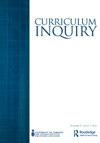Curriculum meets platform: A reconceptualisation of flexible pathways in open and higher education
IF 1.6
3区 教育学
Q2 EDUCATION & EDUCATIONAL RESEARCH
引用次数: 0
Abstract
Abstract In open and higher education, digital technologies are increasingly used to enable flexible learning pathways and unbundle programs into separate courses. Whereas technologies have been praised for enhancing the flexibility of curricula, the implications of going digital have yet to be fully explored in curriculum studies. This article aims to critically investigate how an open education platform, OpenLearn, describes, prescribes, and enacts a particular form of curriculum. Rather than understanding platforms as passive tools for facilitating education, the article draws on theoretical and methodological ideas from science and technology studies (STS) to approach “curriculum” as a collection of socio-technical practices in which platforms play an active role. The findings of our analysis detail how networks of human and other-than-human actors are situated in a wider ecology and enact five curricular practices: prescribing, mobilising, enrolling, evaluating, and rebundling. We propose “platform curriculum” as a sensitising concept to investigate how technologies enable and constrain these practices instead of simply flexibilising them. With this article, we argue for the further adoption of STS in curriculum studies to disentangle the specific ways in which technologies, too, shape education.课程与平台相遇:开放高等教育中灵活路径的重新定义
摘要在开放和高等教育中,数字技术越来越多地被用于实现灵活的学习途径,并将课程分解为单独的课程。尽管技术因提高课程的灵活性而受到赞扬,但数字化的影响尚未在课程研究中得到充分探索。本文旨在批判性地研究开放教育平台OpenLearn是如何描述、规定和制定特定形式的课程的。本文没有将平台理解为促进教育的被动工具,而是借鉴了科学技术研究(STS)的理论和方法论思想,将“课程”视为平台发挥积极作用的社会技术实践的集合。我们的分析结果详细说明了人类和非人类行为者网络如何在更广泛的生态中定位,并制定了五种课程实践:规定、动员、注册、评估和重新绑定。我们提出“平台课程”作为一个敏感的概念,以研究技术如何促进和约束这些实践,而不是简单地使其灵活化。通过这篇文章,我们主张在课程研究中进一步采用STS,以理清技术塑造教育的具体方式。
本文章由计算机程序翻译,如有差异,请以英文原文为准。
求助全文
约1分钟内获得全文
求助全文
来源期刊

Curriculum Inquiry
EDUCATION & EDUCATIONAL RESEARCH-
CiteScore
3.10
自引率
17.60%
发文量
37
期刊介绍:
Curriculum Inquiry is dedicated to the study of educational research, development, evaluation, and theory. This leading international journal brings together influential academics and researchers from a variety of disciplines around the world to provide expert commentary and lively debate. Articles explore important ideas, issues, trends, and problems in education, and each issue also includes provocative and critically analytical editorials covering topics such as curriculum development, educational policy, and teacher education.
 求助内容:
求助内容: 应助结果提醒方式:
应助结果提醒方式:


